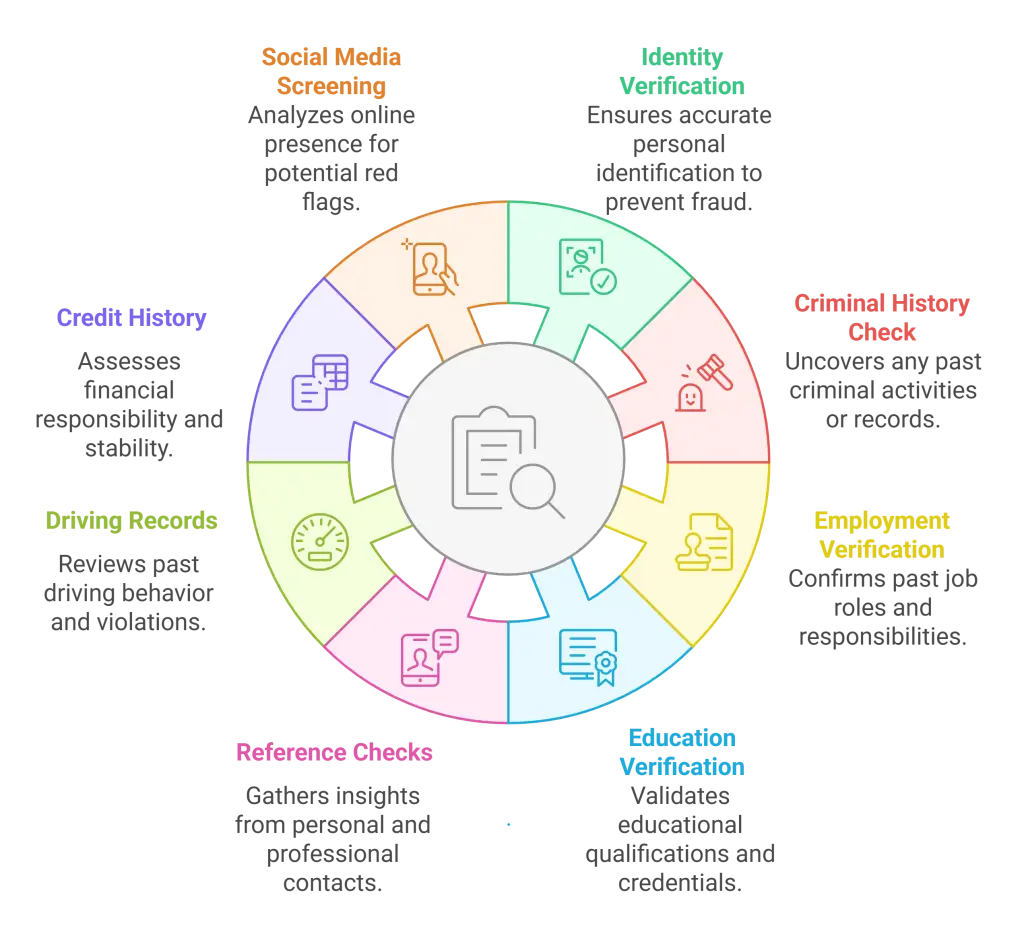Background checks are crucial for various scenarios, such as hiring employees and screening tenants. They help verify the information provided by applicants and protect against potential risks. Skipping background checks can lead to serious consequences, including legal issues, financial loss, and damage to reputation. This guide offers a detailed checklist to ensure thorough background checks, providing you with the tools needed to make informed decisions. By following these steps, you can enhance your safety and security.
Key Takeaways
- Structured Approach: Using a background check checklist ensures thoroughness and consistency, helping mitigate risks and maintain legal compliance1.
- Comprehensive Verification: Effective background checks cover multiple areas, including identity verification, criminal history, employment history, education, and references1.
- Legal Considerations: Adhering to laws like the Fair Credit Reporting Act (FCRA) and Equal Employment Opportunity Commission (EEOC) guidelines is crucial to avoid legal issues1.
- Professional Services: While DIY options exist, professional background check agencies offer expertise, comprehensive services, and access to extensive databases1.
- Interpretation Skills: Learning to interpret background check results accurately, considering context and relevance, is essential for fair and effective decision-making1.
Why You Need a Background Check Checklist
Mitigating Risk
A background check checklist helps avoid potential legal issues, bad hires, and unreliable tenants. It provides a structured approach to gathering and verifying critical information. This systematic method reduces the chances of overlooking essential details that could pose risks. By following a checklist, you can ensure consistency and thoroughness in your background check process. Ultimately, this minimizes potential threats to your organization or property.
Ensuring Compliance
Adhering to legal requirements during background checks is essential to avoid lawsuits and penalties. A checklist ensures you comply with the Fair Credit Reporting Act (FCRA) and Equal Employment Opportunity Commission (EEOC) guidelines. It also helps you stay up-to-date with state and local laws that may affect your background check process. By ensuring compliance, you protect your organization from legal repercussions. Additionally, it promotes fair and non-discriminatory practices.
Saving Time and Money
A checklist streamlines the background check process, making it more efficient and cost-effective. It helps you avoid costly mistakes, such as hiring unsuitable employees or tenants. Following a structured approach, you can quickly gather and verify necessary information. This efficiency reduces the time spent on background checks, allowing you to focus on other important tasks. Ultimately, a checklist helps you manage resources better and avoid unnecessary expenses.
EXPERT INSIGHT: Being an HR professional in an ever-changing workspace, I’ve seen firsthand the vital role of background checks in the success and safety of any organization. They are not just a box to tick off—they’re a crucial part of making informed decisions. Working in a fast-paced environment where we sometimes tend to rush, there is the principle in the background check that is different -- Thoroughness matters more than anything else and the step-by-step process should not be disregarded. This shows that our responsibility is to create a work environment where trust, integrity, and security are at the core. - Charm Paz, CHRP
The Essential Background Check Checklist

Identity Verification
- Full Legal Name: Verify the applicant's full legal name to ensure accuracy in all subsequent checks. This step is crucial to avoid confusion with individuals who have similar names. Confirming the correct name also helps accurately track and verify the applicant's records. This primary verification sets the foundation for a reliable background check. Ensure all documents and records reflect the exact legal name.
- Social Security Number (SSN) Verification: Confirm the SSN to validate the individual's identity and track their records. This helps prevent identity fraud and ensures you check the correct person's history. SSN verification is also essential for employment, confirming eligibility to work in the country. It is a critical step in verifying the applicant's overall identity. Ensure that the SSN matches the name and other provided information.
- Date of Birth: Check the date of birth to ensure it matches the other information provided. This verification helps confirm the individual's identity and prevents fraud. It also assists in accurately retrieving records from various databases. Consistency in the date of birth across all documents is crucial for a thorough background check. Verify that the date of birth aligns with other personal details.
- Address History: Review past addresses to understand the applicant's history and verify their residency. This information can reveal patterns of behavior and stability. It also helps cross-reference other data, such as employment and criminal records. Address history can provide insights into the applicant's reliability and consistency. Ensure that the address history is complete and accurate.
Criminal History
- National Criminal Database Search: Conduct a national search to uncover criminal records. This broad search helps identify any major offenses that might not be evident in local checks. It provides a comprehensive view of the applicant's criminal history. A national database search is essential for a thorough background check. Ensure that the search covers all necessary databases.
- County-Level Criminal Records: Check county records for detailed criminal history. Local records often contain more specific and recent information than national databases. This step helps uncover any criminal activities that occurred within particular jurisdictions. County-level checks are crucial for a complete understanding of the applicant's background. Ensure that you check records in all relevant counties.
- Sex Offender Registry Check: Ensure the applicant is not listed on sex offender registries. This step is critical for positions involving vulnerable populations, such as children or the elderly. It helps protect your organization from potential liabilities and ensures a safe environment. Checking the sex offender registry is an essential part of the background check process. Ensure that you check both state and national registries.
- Federal Criminal Records: Search federal records for offenses not covered in state or county databases. Federal crimes often involve more severe violations, such as fraud or drug trafficking. This step ensures a comprehensive review of the applicant's criminal history. Federal records can provide insights into more significant legal issues. Ensure that your background check includes a thorough search of federal databases.
Employment History
- Verify Employment Dates and Positions: Confirm the applicant's employment history, including dates and job titles. This step helps verify the accuracy of the information provided on the resume. It also ensures that the applicant has the necessary experience for the position. Employment verification is crucial for assessing the applicant's reliability and honesty. Ensure that you contact previous employers to confirm details.
- Contact Previous Employers: Speak with former employers to verify the applicant's performance and reasons for leaving. This step provides insights into the applicant's work ethic and professional behavior. It helps identify potential issues that might not be evident from the resume. Contacting previous employers is essential for a thorough background check. Ensure that you ask specific questions about the applicant's role and conduct.
- Look for Gaps in Employment: Investigate any unexplained gaps in employment history. Gaps might indicate periods of unemployment, personal issues, or other concerns. Understanding the reasons behind these gaps helps provide a complete picture of the applicant's background. Investigating gaps is crucial for assessing the applicant's reliability and consistency. Ensure that you inquire about any periods of unemployment or inactivity.
Education Verification
- Confirm Degrees and Certifications: Verify that the applicant has earned the degrees and certifications they claim. This step ensures that the applicant has the necessary qualifications for the position. It helps prevent credential fraud and misrepresentation. Education verification is essential for positions requiring specific academic credentials. Ensure that you contact the institutions directly to confirm details.
- Verify Attendance at Claimed Institutions: Check that the applicant attended the institutions listed on their resume. This step helps confirm the legitimacy of the educational background and ensures that the applicant's education timeline is accurate. Verifying attendance is crucial for a complete background check. Ensure that you verify both enrollment and completion of programs.
Reference Checks
- Contact Personal and Professional References: Speak with references to gather insights into the applicant's character and work ethic. This step helps provide a well-rounded view of the applicant's suitability for the position. Personal references can offer insights into the applicant's behavior and integrity, and professional references can speak to the applicant's work performance and skills. Ensure that you contact multiple references for a comprehensive view.
- Ask Specific Questions: Inquire about the applicant's strengths, weaknesses, and overall suitability for the position or tenancy. Specific questions help gather detailed information and identify potential concerns. Asking about particular situations or examples can provide deeper insights. This step is essential for understanding the applicant's capabilities and behavior. Ensure that you prepare a list of relevant questions for each reference.
Driving Records (if applicable)
- Check for Traffic Violations and Accidents: Review the applicant's driving record for any violations or accidents. This step is crucial for positions requiring driving responsibilities. It helps identify any risky behavior or patterns of negligence. Checking driving records ensures the applicant's suitability for driving-related roles. Ensure that you obtain a complete driving history from relevant authorities.
- Assess Driving History for Risky Behavior: Determine if the applicant's driving history indicates risky behavior. This step helps assess the applicant's overall responsibility and adherence to laws. A history of traffic violations or accidents might indicate potential risks. Assessing driving behavior is crucial for positions involving driving duties. Ensure that you consider both minor and major infractions.
Credit History (if applicable and permissible)
- Look for Financial Responsibility: Review the applicant's credit history to assess their financial responsibility. This step helps identify potential issues related to financial management. It is especially important for positions involving financial responsibilities. Reviewing credit history provides insights into the applicant's reliability and trustworthiness. Ensure that you comply with relevant laws when conducting credit checks.
- Identify Potential Red Flags: Watch for signs of financial distress, such as bankruptcies or significant debt. These red flags might indicate potential risks, such as financial instability or susceptibility to fraud. Identifying red flags is crucial for positions requiring financial oversight. Ensure that you thoroughly review the credit report for any concerning details.
Social Media Screening
- Review Public Profiles: Check applicants' social media profiles for questionable content or behavior. This step helps identify any online behavior that might reflect poorly on the applicant. It provides insights into the applicant's personality and character. Reviewing social media profiles is an essential part of the background check process. Ensure that you respect privacy and only review publicly available information.
Additional Checks (as needed)
- Professional License Verification: Confirm that the applicant holds any required professional licenses. This step is crucial for positions requiring specific certifications or licenses. It helps ensure the applicant is qualified and legally permitted to perform the job. Verifying professional licenses is essential for roles in healthcare, law, and other regulated fields. Ensure that you contact relevant licensing boards to confirm details.
- Drug Testing: Conduct drug tests if necessary for the position. This step helps ensure a drug-free workplace and compliance with company policies. It is essential for safety-sensitive positions. Drug testing provides insights into the applicant's lifestyle and adherence to company standards. Ensure that you follow legal and ethical guidelines when conducting drug tests.
- International Background Checks: If the applicant has lived or worked abroad, perform background checks in other countries. This step helps provide a comprehensive view of the applicant's history. It is crucial for roles involving international responsibilities or travel. Global background checks ensure that no critical information is overlooked. Ensure that you use reliable sources for international verifications.

How to Conduct a Background Check

DIY Options
- Online Background Check Services: Conduct background checks online. These platforms provide access to various databases and public records. They offer a convenient and cost-effective way to gather information. Online background check services are suitable for basic checks. Ensure that you choose reputable and reliable services.
- Court Records Search: Access court records to gather information on the applicant's legal history. This step helps identify any criminal or civil cases involving the applicant. Court records provide detailed insights into legal issues and outcomes. Searching court records is essential for a thorough background check. Ensure that you check both local and federal court databases.
- Public Records Access: Use public records to verify the applicant's background. Public records include vital records, property records, and more. They provide additional information that might not be available through other sources. Accessing public records helps create a comprehensive applicant profile. Ensure that you use reliable and legal methods to access these records.
Hiring a Professional
- Benefits of Using a Background Check Agency: Agencies offer expertise and comprehensive services, ensuring thorough and accurate checks. They have access to extensive databases and resources. Using a professional agency saves time and provides peace of mind. Agencies can handle complex checks that might be challenging to do independently. Ensure that you choose a reputable and experienced agency.
- Choosing a Reputable Company: Select a reputable background check company to ensure reliability and compliance. Look for companies with positive reviews and industry certifications. A reputable company will follow legal guidelines and provide accurate results. Choosing the right company is crucial for a successful background check. Ensure that you conduct due diligence when selecting a provider.
- Understanding Associated Costs: Consider the costs involved in professional background checks and weigh them against the benefits. Professional services might be more expensive, but they offer thoroughness and accuracy. Consider the long-term savings from avoiding bad hires or risky tenants. Understanding the costs helps you make informed decisions about your background check process. Ensure that you budget appropriately for these expenses.
Legal Considerations for Background Checks
Fair Credit Reporting Act (FCRA)
Ensure you comply with the FCRA, which governs how background checks are conducted and used. The FCRA requires transparency and accuracy in reporting. It mandates obtaining the applicant's consent before conducting a check. Compliance with the FCRA protects your organization from legal issues. Ensure that you understand and follow all FCRA requirements.
Equal Employment Opportunity Commission (EEOC) Guidelines
Adhere to EEOC guidelines to prevent discrimination during the background check process. The EEOC prohibits using background checks to discriminate based on race, color, national origin, sex, or religion. It promotes fair hiring practices and equal opportunities. Following EEOC guidelines helps create a non-discriminatory workplace. Ensure that you implement policies that align with these guidelines.
State and Local Laws
Be aware of and comply with state and local laws regarding background check checklists. Different regions have specific regulations that might affect your process. Understanding these laws helps ensure that your checks are legally compliant. State and local laws might have additional requirements beyond federal guidelines. Ensure that you stay informed about relevant laws in your area.
Obtaining Consent
Always obtain the applicant's consent before conducting a background check. This step is legally required and ensures transparency. It helps build trust with the applicant and demonstrates respect for their privacy. Obtaining background check consent protects your organization from legal repercussions. Ensure that you have a clear and documented consent process.
Adverse Action Notices
Provide adverse action notices if you decide not to hire or rent to someone based on their background check results. This step is required by the FCRA to ensure transparency. It allows the applicant to understand the reasons behind your decision. Providing adverse action notices helps maintain fair and legal hiring practices. Ensure that you follow the proper procedure for issuing these notices.
Conclusion
Background checks are crucial for making informed decisions about employees, tenants, and associates. They help verify information, mitigate risks, and ensure compliance with legal standards. Using a checklist ensures you cover all necessary steps, protecting yourself from threats. Prioritize safety and due diligence in your background check process. Following this comprehensive guide can enhance your decision-making and safeguard your interests.
In conclusion, background checks are not only a list of items that we need to tick to show compliance in the organization or any form of business. It has a lasting impact and effect on any organization and anyone's life. Not being keen on details when it comes to the background checking process can produce costly mistakes so we better do it properly without any form of bias. When it comes to building trust and credibility, consistency matters — every step you take today is an investment in a better future. To conclude, it is always a smart move to stay updated with the laws and best practices revolving around it.
Additional Tips & Considerations
Red Flags to Watch Out For
Be vigilant for red flags, such as discrepancies in information, unexplained gaps in history, or negative feedback from references. These signs might indicate potential issues that require further investigation. Identifying red flags early helps prevent future problems. Being thorough and cautious is crucial for effective background checks. Ensure that you address any concerns promptly and appropriately.
Industry-Specific Background Check Requirements
Some industries have specific background check checklist requirements. For example, healthcare positions might require more stringent checks, including drug testing and professional license verification. Understanding these requirements ensures that you comply with industry standards. Industry-specific checks help ensure that applicants meet all necessary qualifications. Ensure that you are aware of and follow all relevant industry guidelines.
Tips for Interpreting Background Check Results
Learn how to interpret background check results to make informed decisions. Consider the context and relevance of any findings. Not all negative information should automatically disqualify an applicant. Weigh the severity and relevance of issues against the applicant's overall qualifications. Interpreting results accurately is crucial for fair and effective decision-making. Ensure that you approach the process with an open mind and critical thinking.
Common Mistakes to Avoid
Avoid common mistakes, such as failing to verify information or neglecting to follow up on red flags. These errors can lead to hiring unsuitable employees or accepting risky tenants. Being thorough and diligent in your background check process helps prevent these issues. Common mistakes can undermine the effectiveness of your checks. Ensure that you have a robust and systematic approach to avoid these pitfalls.
Call to Action
Ready to make informed decisions with confidence? Download our free background check checklist template from GCheck to ensure you cover all the essentials. Our template is designed to streamline your process and help you avoid costly mistakes.
For a more comprehensive solution, explore GCheck's professional background check services. Our team of experts provides thorough, accurate, and compliant background checks tailored to your needs. Don't leave it to chance—trust GCheck to safeguard your organization.
By following this comprehensive guide, you can conduct thorough and effective background checks, ensuring you make informed decisions about the people you hire, rent to, or otherwise engage with. This checklist will help you mitigate risks, ensure compliance, and save time and money, ultimately safeguarding your interests and promoting a safe and reliable environment.
Still have questions?
Get in touch with our team today for a personalized demo and discover how our tailored volume pricing and packages can drive results for your business!
How useful was this page?*
Note: your comments are anonymous. We use them to improve the website. Do not include any personal details.
Visit our FCRA Compliance Tool or leave a message here if you need a response.
From the blog Explore the GCheck Content Hub

Hybrid Workforce Background Screening: Strategic Compliance for Distributed Teams in 2026
19 Jan, 2026 • 18 min read
Building a Strategic Screening Framework for International Hires in 2026
14 Jan, 2026 • 15 min read
Drug Testing Policies for Remote Employees: A 2026 Compliance and Strategy Guide
13 Jan, 2026 • 21 min readThe information provided in this article is for general informational and educational purposes only and should not be construed as legal advice or a substitute for consultation with qualified legal counsel. While we strive to ensure accuracy, employment screening laws and regulations—including but not limited to the Fair Credit Reporting Act (FCRA), Equal Employment Opportunity Commission (EEOC) guidelines, state and local ban-the-box laws, industry-specific requirements, and other applicable federal, state, and local statutes—are subject to frequent changes, varying interpretations, and jurisdiction-specific applications that may affect their implementation in your organization. Employers and screening decision-makers are solely responsible for ensuring their background check policies, procedures, and practices comply with all applicable laws and regulations relevant to their specific industry, location, and circumstances. We strongly recommend consulting with qualified employment law attorneys and compliance professionals before making hiring, tenant screening, or other decisions based on background check information.

